
Banner
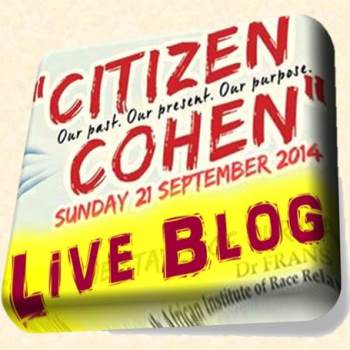
Citizen Cohen – follow the LIVE BLOG
Published
10 years agoon
By
adminANT KATZ
As always, the Cape people have outdone themselves and both the theme and content of the conference has been carefully chosen to suit the times. SAJR ONLINE will be there and live blogging for those in Cape Town, around SA and globally who can’t attend but would like to follow the proceedings. Read the programme, see their stunning posted and join us on Sunday – at the venue or from anywhere on the planet…
Users please note:
- As with any live blogging, users should respect the fact that speed is often given preference over accuracy and that typographical errors can and will occur.
- Similarly, it is important to note that – with regard to speeches – this blog is a paraphrasing of what is said, and not a verbatim account.
- Anything that is, in fact, verbatim will be clearly denoted within quotation marks.
LIVE POSTS from Sunday’s annual conference of the Cape Council of the SA Jewish Board of Deputies. As always, the Cape people have outdone themselves and both the theme and content of the conference “Citizen Cohen – Our past; Our present; Our purpose!” has been carefully chosen to suit the times.
- As each new post is updated, the time will be reflected on the top of the home page of the website, users are required to “refresh” the page (Press F5 on the top row of buttons on your computer) to update new posts.
- Updates will be posted between 15 and 30 minutes apart and may include links to other documents on the site, such as PDF’s of speeches, links to read more about participants, in-depth detail of the topics being discussed, etc.
- Remember: simply press the F5 key on your computer to update the latest postings.
READ THE PROGRAMME on this website, see their stunning
poster (below on this page) and stay with us on
Sunday – at the venue or from anywhere on the planet…
See more on the Cape Board website:
www.capebod.org.za/citizencohen
–
FINAL POST 13h57 >>>>>>>>>>>
SESSION 4: The Great Debate: Looking In/Looking Out: Where Should our Focus be.
Facilitator: JUSTICE DENNIS DAVIS.
Panel: RABBI JONATHAN ALTMAN, DR REBECCA HODES
REBECCA: Dr Hodes spoke on the fact that throughout history humans have feared what the next generation will bring. We have heard a lot of these sentiments aired today, she said.
Are SA Jewry less influential than their parents and grandparents?
- Many of the most influential organisations that have emerged in SA over the past few years have been headed by Jews.
- While young Jews may not be involved in political parties, the influence of their views are nonetheless just as powerful as they ever were.
- Having a more outward-looking perspective does not make us any less influential.
RABBI JONATHAN:
For me the debate today is not whether SA Jewry should become more inwardly based, but bigger than that:
- People have become less actively involved with each other
- They attend fewer communal events
- There is a lack of commitment to Jewish literacy
- Because of these and other reasons, says Rabbi Jonathan, we need to be more inward focused.
Judaism compels us to embrace Tikun Olam – to repair the world in the name of the Almighty.
So, from its lofty origins it has come to mean the caring of Jews for and about non-Jews.
Joel Alperson says Tikun Olam does little to help to build Jewish communities.
What is Judaism? The fact that we have the Jewish literacy to be part of one.
REBECCA – rebuttal
The most remarkable thing about being a Jew is that I can be a Jew and still be an atheist. I can be a Jew and be a twice-a-year shul-goer.
JONATHAN – rebuttal
I love Jews. All Jews. Except that I think that the argument that has to be made between identity and identification. What makes us Jewish?
When I am out there, how do people know that I am doing Tikun Olam as a Jew?
JUSTICE DENNIS: What powers that identity? It emerges from a kind of contextual culture.
REBECCA: I think the rabbi feels he can define Jewry in a single context. I think in a strange way, it’s the liberalpParadox – every opinion should be allowed – unless they are abhorrent.
JUSTICE DENNIS: I have battled with this my entire life. From whence does this feeling come?
REBECCA: I am not sure what a Jew is. I think you know one when you see one. You are one if you feel like one.
JUSTICE DENNIS: Jonathan, how can one compress this into a box and say that everyone who is outside the box is treif?
JONATHAN: I have said from the beginning that I am challenging Rebecca, that there is more than just an academic approach. Taking into account everything that I have come from and using that to define myself outside.
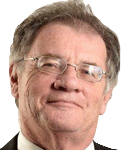 JUSTICE DENNIS: I think that we have turned so inwards that we can’t see out. Didn’t modern Orthodoxy collapse?
JUSTICE DENNIS: I think that we have turned so inwards that we can’t see out. Didn’t modern Orthodoxy collapse?
JONATHAN: I think it had to collapse. But on the other side there is a huge imbalance. But where is the strength of the Jews building other organisations coming back into the Jewish community?
DENNIS DAVIS: Inward/outward – The Board and Jewish establishment are equally guilty of using struggle credentials and icons to a large extent to disguise the majority who were not.
REBECCA: I feel like I can’t open a door at UCT without running into a Jewish academic. We are a people of unpretentious intellectualism. Jewish homes have religious books – but many other books as well. I can tell a Jewish student – they are the ones who will ask questions, who will have the chutzpah to challenge the conventional wisdom.
DENNIS DAVIS: I remember complaining to Rabbi Bernard during the Struggle about where the Board and other Jews were and why they were not there.
JONATHAN: We all believe that the Jewish people have a roaring flame within them to do good. But that’s not the question here. Jewish literacy is not about having hot-headed debate. That’s not what is needed.
DENNIS DAVIS: Tell me where I can tell the next generation to go where they can listen to a lecture which will give them an understanding of the tapestry of Jewish literacy?
JONATHAN: The Internet is the resource. But I feel that there is a lack of desire among young people to learn.
DENNIS DAVIS: It seems to me ridiculous that we have Sinai Indaba and Limmud – I have about eight questions about that here.
JONATHAN: You have presented that there are different things, why do you want to get rid of one?
REBECCA: That’s not the point, it’s oppositional based. It is a waste of resources and it is divisive.
DENNIS DAVIS: So is inwardness sufficient for you to meet all the needs of all the Jewish members of society.
JONATHAN: Are those same people who go to Limmud also going to Sinai Indaba? No. There are different strokes for different folks.
DENNIS DAVIS to REBECCA: You say you are an atheist Jew. Does that not mean that there will one day be no Jews?
REBECCA: No. But in any event I am agnostic not an atheist. My father says I like to hedge my bets.
Final reflections:
REBECCA: Feminism is the “F” word but actually it is just someone who believes in equality. Thank you very much and I enjoyed the good sparring match with Jonathan.
JONATHAN: We were meant to be a kingdom of priests and we have to carry that message to the rest of the world. But are we going to deliver the message to the next generation inward
DENNIS DAVIS: Some final remarks about some things that struck me: Firstly, it was clear that there are two things that the Board could become involved in.
I just think that – when we are so few Jews in SA – the notion that we do not want to encourage everyone to participate, and particularly the young, we should be worried about that.
I don’t know what kind of answers there are. Judge for yourself!
David Jacobson closed by thanking everyone for sharing their Sunday. “We are all Citizen Cohen,” said David. One thing is certain, he said, SA Jewry “have a rich history in SA, and we are going to have a rich future!”
A closing prayer and blowing of shofar was left to the newly-appointed chairman SAAPR, Rabbi Greg Alexander, who again blew the shofar and the customary anthems.
>>>>> POSTED 12:30 >>>>>>>>>>>
Yoni Bass:
I grew up in a post-apartheid South Africa. Our community benefited hugely from apartheid. My start in life was very Jewish: Jewish schools, Habonim Dror, university.
But then I became involved in “Equal Education” and you will be surprised how many young Jewish people are involved in community work.
Formal Jewry is too quick to attack differing views. Sometimes the Board does not serve all SA Jews.
Becoming involved in movements and organisations is something that many more in SA Jewry should be doing. Giving of our bodies, minds and resources.
Rael Kaimowitz:
In SA we need to understand that we need our point of view heard by lobbying and educating – what we stand for and what we stand against.
We are facing increasing anti-Semitism and anti-Israel. Our constitutional rights are not always respected by our enemies.
1. Classic SAJBD reactive cases: Lobbying UCT when exams are scheduled over Jewish holidays
2. Examples of proactive cases: B-Jen and similar initiatives
During Operation Protective Edge this came out when a B-Jen black businessman spoke out for Israel, said Kaimowitz.
Lobbying on behalf of the Jewish community is the job of the Board – both proactively and reactively.
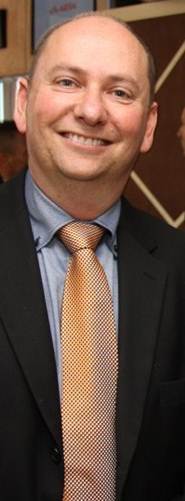 Facilitator questions:
Facilitator questions:
HOWARD (RIGHT) to YONI – how influential was Habonim to the creation of Equal Education? YONI: Mary Metcalf ascribed the success to two organisations, one being Habonim Dror.
HOWARD to BARBARA – how does your Jewishness go down in the townships? BARBARA: I wear my Jewishness privately but openly. When issues arise I believe in engaging with people, explaining Judaism, talking about Israel.
HOWARD to BAGRAIM: Do people know and understand you are Jewish in Parliament and how do they react? BAGRAIM: Yes, everyone knows. Nobody has shown any anti-Semitism – Julius Malema even hugged me!
HOWARD to RAEL – as a lobbyist, have you noticed a change in the reaction to statements like Tony Ehrenreich’s that Jews have no place in SA? RAEL: Most people don’t feel that way, but it was nice that the official policy of a two-state solution was endorsed by Government last week.
Q+A Session
Q – Were Jews maybe more involved in the political struggle in SA because there was a need back then. Maybe that’s why today they are seeing the social challenges as the place to be.
A – MICHAEL BAGRAIM – I don’t agree. I think the real struggle in SA is jobs. It is much bigger than social problems. Seven out of ten 16-30-year-old blacks don’t have jobs.
Q – ANN HARRIS to BARBARA – Do you think you have been able to pass your passion on to your children? BARBARA: Yes, I think by example. I am not a rabble-rouser or a politician.
Q – many of us sitting here can reference but have never experienced the type of anti-Semitism our grandparents experienced. So, while I applaud the efforts of the Board to date, I wonder whether it isn’t time to change its approach? MARY KLUK: You have just seen a presentation of all our outreach programmes. But we have to accept that anti-Semitism is a virus… an ancient virus. She said that while it couldn’t be stopped, the Board would always do its best to mitigate it
Q – I wonder if Yoni knows how many people in this room are angry with Habonim and see them as supporting our enemies? (applause) YONI: there is a tendency to lump whole groups of Jews together and make spaces uncomfortable. That is what I spoke about earlier and this is an example of what I said. (louder applause)
Q – I completely endorse Yoni – it’s not about us being patronising – we owe it to our young people to listen to them. We have to talk to them, they are our future leaders, and not prescribe to them. (loudest applause)
FACILITATOR HOWARD SACKSTEIN points out that there are about five people under 30 among the 150 delegates.
HOWARD asks panelists if they could give a single piece of advice on how SA Jewry could change things for the better, what would it be?
YONI – as a Jewish community, we need not to feel threatened by different types of Jews and we should try and ensure that they all want to be at and appear at places like this. That not every criticism be regarded with enmity. We need to find a place for Jews of all opinions and persuasions and we need to accommodate them, he said profoundly.
BARBARA – We have to decide how we have inter-generational conversations. She said this was very important for SA Jewry.
BAGS – I sometimes feel (having recently become an MP) as if I have immersed myself in a well, like Alice in Wonderland – but if I have encouraged just one person in this room to look to becoming involved in politics, I will be pleased.
RAEL – there is a story about an old village where they decided to come out with their own blend of wine. Everyone was asked to bring a single glass and put it into a barrel. One chochum decided “what difference will it make if I take a glass of water with all those glasses of wine?” In the end, when they tapped the barrel, it was pure water. Everyone had done the same thing. I would encourage everyone to start bringing a glass of wine to the table. He said, Judaism is not a spectator sport.
>>>>> POSTED 11:20 >>>>>>>>>>>
Michael Bagraim – Why did our political activism drop?
Sitting in the august houses of Parliament, I am sometimes gobsmacked that we can spend hours discussing nothing. Bagraim explained the many conundrums that the religion of Judaism prescribes for politicians.
There are now three Jewish parliamentarians. Glynnis Breytenbach has only recently discovered that her mother was an Orthodox Jewess.
I challenge everyone here – we look after our own community – but I believe that if everyone in this room shared their affiliations with each other – think how powerful we could be.
What is it? The history of SA and Cape Jewry is straddled by Jews. Mayors. MPs. No-one is telling us we can’t do it – we just don’t do it.
We need to watch that we don’t become too complacent, he says. We need to become more involved.
Barbara Millar:
I was born to Jewish parents with SA and German roots. My father was on the last ship allowed into SA, the Stuttgart. When my own children were of the age my father had been when he left Germany, I realised how brave he must have been.
From him I inherited the courage to fight injustice. From my mother I have a sense of SA Jewry. She was the daughter of a religious Lithuanian family.
I take pleasure in interfaith contact, of explaining our traditions and learning about theirs.
I dabbled with activism and joined Jews for Justice. Imagine an oasis of green, lush lawns.
My parents were poor. Poverty is not a fact of nature, but can be risen out of. The Torah says we must help people out of poverty. The circumstances that led me to social activism are different to others. What would cause you to heed the call to action – I encourage every one of you to become involved, she said.
Do not be afraid to get involved. Your lives will be enriched by it. As has mine.
>>>>> POSTED 10:58 >>>>>>>>>>>
SESSION 3: Making a difference, differently – SA Jewry’s citizenship under the microscope.
Facilitator: Howard Sackstein opens with some hilarious anecdotal stories on the history of SA Jewry in politics.
But, says Howard, where have all the Jews gone in the ANC, politics and NGOs? Why do those of us who are activists are only involved in Jewish and Israeli affairs?
Howard says that when he was in the resistance movement his run-ins were mainly with Jewish authorities. He was threatened with arrest by Jewish policemen, a rabbi and even the SAJBD which threatened that if he didn’t toe the line he could lose his legal job.
Today, says Howard, we as a Jewish community have built our own structures, we are doing better than other communities because we have isolated ourselves from the broader community. We are guilty, he says, of “slacktivism” and not activism. Facebooking complaints to friends is not doing anything. Right now our isolationism is at its greatest.
Now, when the ANC accuses Jews of Nazism, it is time for us to decide to become part of the solution or staying out and bearing the consequences.
Panel: Michael Bagraim, Yoni Bass, Barbara Miller, Rael Kaimowitz
>>>>> POSTED 10:41 >>>>>>>>>>>
Q+A Session
Q – Public violence is higher than ever before, ANC is attacking Chapter 9 Institutions, are we not at the Rubicon?
A – Yes, we see all the signs of similarity between the Rubicon time and today – the consequence of unmet expectations is playing itself out already – we have to manage that.
Q – How do you see the middle-management approach in that we are not producing enough doctors and that NHI targets won’t be met?
A – NHI is an illusion, it is impossible that it can happen – but the ultimate healthcare solution is to have people working for it.
Q – Do you ever see the ANC liberating themselves from SACP/Cosatu?
A – ANC realise that the only way out of their political crisis is attracting the investment to create the jobs to grow the economy. They will have to tell their partners at some stage that they are holding the country back. We are slowly moving to changing policies on labour.
Q – In prop market opportunity for becoming a sellers’ market?
A – We take the view that 3-4% GDP growth the property market stays a buyers market. Only the W/Cape may perform better.
Q – What’s going on in ANC NEC, timing of Zuma’s coming or going?
A – You have to have an EFF in a country like ours. In the ANC, people are starting to walk out. Manual, Marcus. It’s like the battle between the Verligtes and Verkramptes – the difference is that the Verligtes has public support, the ANC do not have that advantage.
Q – Is there any question of a Scotland solution and the Cape breaking away?
A – We don’t think so in the short term, but we believe in a federal system. But we do believe it should remain on the table as a topic of conversation. You can’t run the country from Pretoria. I think corporate HQs are going to be moving to CT.
Q – Talk of between 4 and 7 mil foreigners in SA?
A – Nobody knows the numbers on foreigners. We think a conservative 2 mil – but every country that draws immigrants draws benefits from getting the best of foreigners. We think they are good. And in any case, even if you don’t agree, there is nothing you can do about it! SA will be shocked at the speed at which political changes can happen. Reform will come, either from the ANC or the DA.
>>>>> POSTED 10:17 >>>>>>>>>>>
PANEL SESSION 2: The States of our Nation
Chaired by Beverley May, An analysis of SA’s past and a projection of its future, Dr Frans Cronje of the SA Institute of Race Relations
Cronje says his brief is ambitious – to take the audience through the next ten years.
Evening of August 15 1985 – the night of the “Rubicon Speech” by PW Botha. The country becomes bankrupt and is fighting Cubans in Angola. 10 years later we have a new SA>
The first piece of information he shows is the RBLI (Reserve Bank Index) on GDP growth. While RBLI is stable, GDP is going down fast.
The problem, he says, is labour market. 10-mil black SA working. Over 75% blacks not working and 10% whites. We are managing one third of what we need to, he says.
SA’s developmental policy model – added 6 million jobs since 1994 but much slower in past 10 years. 500 000 people making 16-million social grants possible.
Living standards measures have increased dramatically – LSMs.
2001 – 2014 – 5-million people have moved out into higher LSMs. SA has become the world’s biggest welfare state.
Impending feeling of doom – between 1994 huge growth of people living in formal with electricity.
Service delivery has grown faster than people think.
Every day 1 000 move into houses and 100 into shacks.
For every I newly built shack since 1994 there have been 13 formal houses built.
Violent protest actions grown from around 1,000 a month in 2004 to almost 2,000 now.
The only viable way to bring this down is by creating jobs.
Polls “Do you believe delivers services well?”
Living standards have improved well, now people want more and the labour market doesn’t allow them in. What does Govt do?
Agriculture, mining, manufacturing have all dived as percentage of GDP. So the industries that would have allowed entry into the labour market have collapsed.
The only industry growing is specialised IT and hi-tech – fast!
250 000 drop out after grade 10 and 300 000 after grade 11. The standards have been dumbed down; 4% get matric maths. What you are not seeing, is the missing people who are going to find it increasingly hard to find work.
Other obstacles:
- Eskom power growth of 40MW in 2009 to 50 000 by 2020. At 3-4% economic growth we will not be able to power it
- 2020 deficit could be as much as having to build two more giant power stations every five years
- Government expenditure increasingly higher than income.
- Government running out of money.
- 1994 t0 2014 household debt to disposable income raised from around 40% to 80%
- Government running out of options,
Future options
- Government transforms economy – 5% growth to 2020
- Refusal to change – much less
2019 – ANC forcing economic growth will take support to 58%
2019 – middle path – ANC 60% and falling
2019 – ANC staying as it is – DA can win election
>>>>> POSTED 09:44 >>>>>>>>>>>
Eric Marx explained the Jewish Next programme that the Cape Board had started over the past year.
Moishe House, in Vredehoek, is the first of its kind in SA. A new Cool Jews and Ignite Programmes have also been added – more on those after conference.
The Political Lobbying Department is one of the most significant roles of the Cape Board.
B-Jen – partnering with black entrepreneurs and Investec has been so successful that it has been taken up by Gauteng and KZN.
We held two transformation conversation events – on Immigration policy, and 20 years on.
Internationally, the Board has continued to maintain relations with world Jewry.
He says he would like to see the Board’s interfaith work increased.
Marx made a special mention of the Cape Board’s activity with regard to bursaries, under Jodi Goldberg, which had distributed over R1mil for tertiary education this year.
He thanked the professional staff who had done so much work under difficult circumstances over the past months.
He also thanked his executive.
>>>>> POSTED 09:35 >>>>>>>>>>>
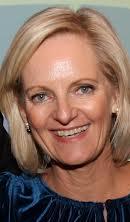 Mark Kluk (LEFT) speaks, speaks about the strength of SA Jewish management. Anti-Semitism during and after the Gaza operation has been appalling. Cape Town has had some of the worst of it.
Mark Kluk (LEFT) speaks, speaks about the strength of SA Jewish management. Anti-Semitism during and after the Gaza operation has been appalling. Cape Town has had some of the worst of it.
Kluk promised the national Board was doing everything it could and mentioned the MEETING WITH PRESIDENT ZUMA on Thursday.
Cape Board chairman Eric Marx delivers his Chairman’s Report – which Jewish Report will publish on Monday.
In Cape Town we have an ANC under Marius Fransman which is not friendly to SA Jewry. Nealy 90 instances of anti-Semitism were reported to our CSO in July alone.
At the MEETING WITH PRESIDENT ZUMA on Thursday he committed his government to fighting against racism in all its forms.
>>>>> POSTED 09:15 >>>>>>>>>>>
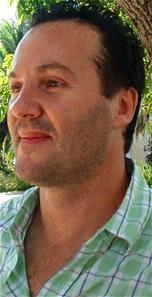 After an opening prayer and blowing of the shofar by Rabbi Asher Deren, executive director of the Cape SAJBD David Jacobson – SA Jewish community was formed in Cape Town and is still the home of SA Jewry – despite the lesser numbers than in Jhannesburg. SA Jewry has been part of the defining of SA. We are Citizen Cohen, following our pioneering ancestors who came to SA to give us a better life.
After an opening prayer and blowing of the shofar by Rabbi Asher Deren, executive director of the Cape SAJBD David Jacobson – SA Jewish community was formed in Cape Town and is still the home of SA Jewry – despite the lesser numbers than in Jhannesburg. SA Jewry has been part of the defining of SA. We are Citizen Cohen, following our pioneering ancestors who came to SA to give us a better life.
Now we have to become pioneers again. We have to be part of the future of SA. Citizen Cohen is as much a part of SA as Citizen Kunene.
>>>>> POSTED 09:00 >>>>>>>>>>>
POSTED 09:00 from Sunday’s Cape SAJBD “Citizen Cohen – Our past; Our present; Our purpose!” live blog.
TG the conference is running on Jewish time as your intrepid blogger did the cleverest thing ever and locked his keys in his boot this morning – requiring a call-out to the KIA 24-hour hotline. All credit to them, they had a locksmith on site in Sea Point within 20 minutes – and here we are, start up and waiting for the conference to begin.
SAJBD National Chairman Mary Kluk has just taken her seat.
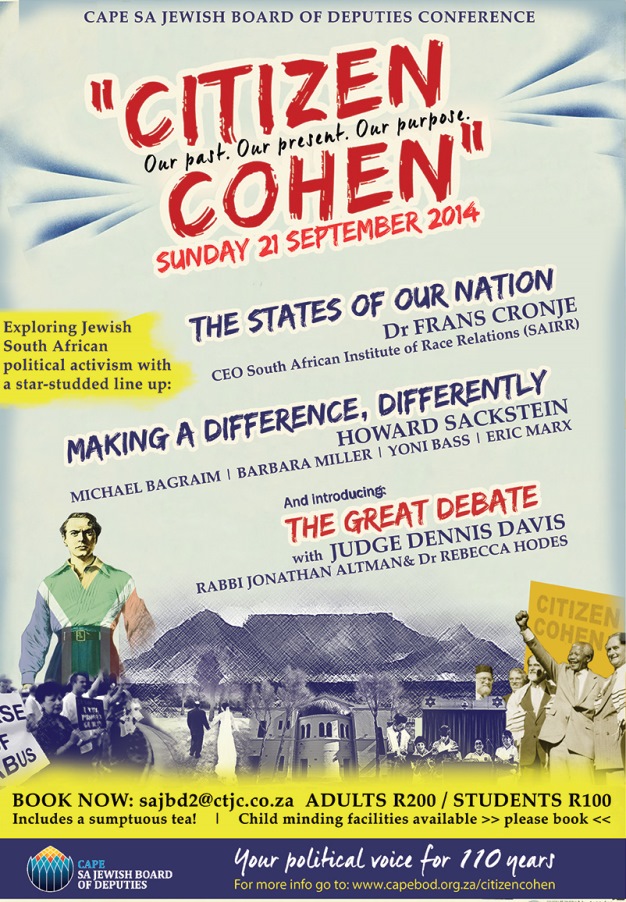
The poster for the event




